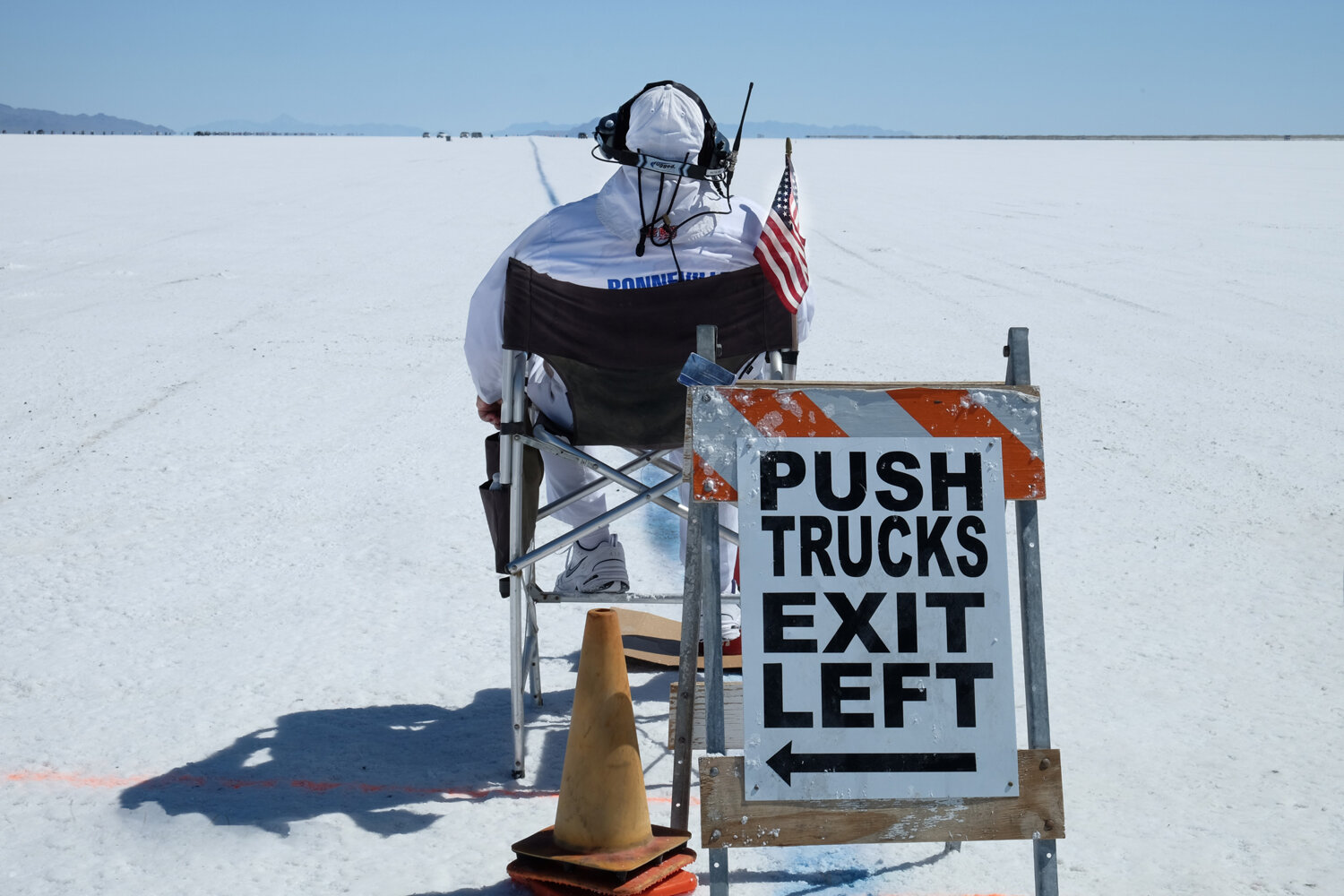Detour #122: Bonneville Salt Flats, Utah, USA
Photo Shutterstock
If you feel the need for speed then Bonneville should be on your bucket list, says Gavin Conway.
White just doesn’t come any whiter. Or vastness any more vast. Or, as it happens, madness quite so acutely beyond imagining.
This is the Bonneville Salt Flats. Simply viewed, it is a colossal dried salt-lake bed in a truly obscure corner of western Utah, near the town of Wendover. A place to run-what-you-brung, where the engine ante starts at 50cc and does not quit until way beyond 25-litres. And there is simply nothing on earth to match the petrol-head nirvana of Speed Week, the single most celebrated seven days of the Salt’s year.
It’s like this. Drive to the edge of the lake, where your credentials are checked and you’re waved onto the salt. The paddock is out of sight, five miles away in the middle of a great big empty, the route out there marked with sparsely dropped cones. Drive your road car as fast as it goes, remembering to lift for the glinting huddle of men, women, and machines as it emerges through the shimmer. Dismount into brightness so sharp you squint. Expect disorientation, the unexpected, the inexplicable.
Photo Billy Clouse / Unsplash
People have been coming to the Bonneville Salt Flats to see how fast their ride is since 1914, when Teddy Tetzlaff set a speed record at 141.7mph in his ‘Blitzen-Benz’. He was famously followed years later by Ab Jenkins, who set numerous distance and endurance records on the Flats. And the suitability of the Salt Flats for achieving monstrous speeds soon attracted speed-mad Brits; in 1935 Sir Malcolm Campbell set a record of 301.1mph.
But Speed Week is really the domain of ordinary Joes with a dream of going faster than they’ve ever gone in their lives. Sometimes in creations that truly confound belief – how about a rear-wheel drive 1950s Citroen DS with a supercharged V8? Indeed, the cars that come here get more improbable every which way you look.
Speed Week got properly underway in the late 1940s. It kicked off when the Southern California Timing Association (SCTA) reckoned they needed more distance and a better surface to run their time trials. It also coincided with the news that drop-tank fuel pods from long distance aircraft made pretty swift record runners when equipped with wheels, a flathead V8 and someone sufficiently lacking in imagination to want to drive an empty fuel tank at colossal velocity. They’re known locally as ‘Belly Tank Lakesters.’
Photo Shutterstock
In the first ever running of Speed Week, a Lakester set a class record of 187.89mph. The team had some help with the engine from a fellow called Vic Edelbrock. Today, Speed Week is still about class records but the number and type of classes is staggering. The course itself is set up in a giant V, with the left arm the short course at five miles and the right running to seven-mile markers. The timing station sits in the middle of the V, where it’s assumed even a wobbling 400mph streamliner would have room to miss.
When I arrived Lee Kennedy had been trying for ten years. A big bloke with a ‘rodders goatee he ran an Alfa Spider with a difference: as in a 440cu in Chevrolet big block married to a tank of nitrous oxide. As I caught up with Lee he’d just run at 251mph, enough for a class record in the unblown modified sports class. At those sort of speeds, the open cockpit the class demands presented Lee with a bit of a moment: “Just turned my head a little and the wind caught it. Jammed it right up against the roll cage at right angles, so I sort of had to peer out with my left eye.” I didn’t bother asking if he’d thought of lifting. They never do around here.
Looking back over my shoulder to the short course, Lee spotted a spin about to happen: “Oh look… He thinks he’s caught it. He hasn’t.” With that, a ’34 Ford hot-rod arced into a slow 140mph spin, graceful and harmless. Injuries are pretty rare at Speed Week, and the last fatality was over 15 years ago. Doesn’t stop them trying, though.
Carl Heap ran one of the more unusual Flats contenders. ‘The Phoenix’, a 1943 International long-haul tractor trailer, a big rig even by American standards. I asked Carl what was beneath the bonnet: “Well, we’re running a 24-litre V16 Detroit diesel putting out around 4000bhp. It’s got four turbos and two superchargers. The rig’s a bit heavy at 18,000Ibs but it goes well enough.” Translating to a terminal velocity of just a shade over 232mph. So that explained the Boeing 707 nose-wheel tyres at the front and 727 main-gear wheels on the back.
And then there was the 1971 667cc Honda, owner Bob Gamer bursting with pride that he’d managed to thrash it to 86.935mph - believe me, the decimal points count – out of his little screamer.
That’s the point about Speed Week; Lee Kennedy, vice president of the SCTA, told me that there is a class for just about every vehicle known to mankind. “One fellow turned up in a big old motorhome, bolted in a roll cage and headed off down the short course. I don’t think he quite managed to crack 100mph, but he sure did try.”
Photo Shutterstock
Which led me to Al Teague. His Blown Fuel Streamliner was one of the fastest wheel-driven cars on the planet, with a posted one-way run 432mph. He’s been a master player and a regular at Speed Week for as long as folks remember. Usually sets the speed to beat for next year, too. I ran across him when my stupidly parked car blocked his Spirit of ’76 streamliner on the paddock lane. I expected, deserved a tirade of abuse, but Al just popped the canopy, leaned out wide and asked if maybe I’d move over about ten feet. He smiled big, dropped back into the car to get ready for 400mph plus.
Off he thundered. The mega engined streamliners all get a shove off the line from a truck because first gear tends to be ridiculously tall, not really usable this side of 60mph. Then they just go, slowly diminishing into the shimmer, first a small distant dot and then gone forever into that vast white glare.
All you really know for sure is that they’ll be back, looking for the only thing that has ever really mattered on the Bonneville Salt Flats.
Just a little bit more speed.
Words Gavin Conway Twitter | Instagram







